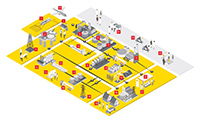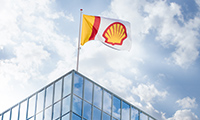About this publication
This Investors' Handbook contains detailed information about our annual financial and operational performance over varying timescales from 2015 to 2019. Wherever possible, the facts and figures have been made comparable. The information in this publication is best understood in combination with the narrative contained in our Annual Report and Accounts and Form 20-F for the year ended December 31, 2019.
Reserves: Our use of the term “reserves” in this publication means US Securities and Exchange Commission (SEC) proved oil and gas reserves.
Resources: Our use of the term “resources” in this publication includes quantities of oil and gas not yet classified as SEC proved oil and gas reserves. Resources are consistent with the Society of Petroleum Engineers (SPE) 2P + 2C definitions.
Shales: Our use of the term “shales” refers to tight, shale and coal-bed methane oil and gas acreage.
All peak production figures in Portfolio Developments are quoted at 100% expected production.
The companies in which Royal Dutch Shell plc directly and indirectly owns investments are separate legal entities. In this report “Shell”, “Shell Group” and “Royal Dutch Shell” are sometimes used for convenience where references are made to Royal Dutch Shell plc and its subsidiaries in general. Likewise, the words “we”, “us” and “our” are also used to refer to Royal Dutch Shell plc and its subsidiaries in general or to those who work for them. These terms are also used where no useful purpose is served by identifying the particular entity or entities. ‘‘Subsidiaries’’, “Shell subsidiaries” and “Shell companies” as used in this report refer to entities over which Royal Dutch Shell plc either directly or indirectly has control. Entities and unincorporated arrangements over which Shell has joint control are generally referred to as “joint ventures” and “joint operations”, respectively. Entities over which Shell has significant influence but neither control nor joint control are referred to as “associates”. The term “Shell interest” is used for convenience to indicate the direct and/or indirect ownership interest held by Shell in an entity or unincorporated joint arrangement, after exclusion of all third-party interest.
This report contains forward-looking statements (within the meaning of the U.S. Private Securities Litigation Reform Act of 1995) concerning the financial condition, results of operations and businesses of Royal Dutch Shell. All statements other than statements of historical fact are, or may be deemed to be, forward-looking statements. Forward-looking statements are statements of future expectations that are based on management’s current expectations and assumptions and involve known and unknown risks and uncertainties that could cause actual results, performance or events to differ materially from those expressed or implied in these statements. Forward-looking statements include, among other things, statements concerning the potential exposure of Royal Dutch Shell to market risks and statements expressing management’s expectations, beliefs, estimates, forecasts, projections and assumptions. These forward-looking statements are identified by their use of terms and phrases such as “aim”, “ambition”, ‘‘anticipate’’, ‘‘believe’’, ‘‘could’’, ‘‘estimate’’, ‘‘expect’’, ‘‘goals’’, ‘‘intend’’, ‘‘may’’, ‘‘objectives’’, ‘‘outlook’’, ‘‘plan’’, ‘‘probably’’, ‘‘project’’, ‘‘risks’’, “schedule”, ‘‘seek’’, ‘‘should’’, ‘‘target’’, ‘‘will’’ and similar terms and phrases. There are a number of factors that could affect the future operations of Royal Dutch Shell and could cause those results to differ materially from those expressed in the forward-looking statements included in this report, including (without limitation): (a) price fluctuations in crude oil and natural gas; (b) changes in demand for Shell’s products; (c) currency fluctuations; (d) drilling and production results; (e) reserves estimates; (f) loss of market share and industry competition; (g) environmental and physical risks; (h) risks associated with the identification of suitable potential acquisition properties and targets, and successful negotiation and completion of such transactions; (i) the risk of doing business in developing countries and countries subject to international sanctions; (j) legislative, fiscal and regulatory developments including regulatory measures addressing climate change; (k) economic and financial market conditions in various countries and regions; (l) political risks, including the risks of expropriation and renegotiation of the terms of contracts with governmental entities, delays or advancements in the approval of projects and delays in the reimbursement for shared costs; (m) risks associated with the impact of pandemics, such as the COVID-19 (coronavirus) outbreak; and (n) changes in trading conditions. No assurance is provided that future dividend payments will match or exceed previous dividend payments. All forward-looking statements contained in this report are expressly qualified in their entirety by the cautionary statements contained or referred to in this section. Readers should not place undue reliance on forward-looking statements. Additional risk factors that may affect future results are contained in Royal Dutch Shell’s Form 20-F for the year ended December 31, 2019 (available at www.shell.com/investor and www.sec.gov). These risk factors also expressly qualify all forward-looking statements contained in this report and should be considered by the reader. Each forward-looking statement speaks only as of the date of this report, April 15, 2020. Neither Royal Dutch Shell plc nor any of its subsidiaries undertake any obligation to publicly update or revise any forward-looking statement as a result of new information, future events or other information. In light of these risks, results could differ materially from those stated, implied or inferred from the forward-looking statements contained in this report.
This Report contains certain following forward-looking Non-GAAP measures such as cash capital expenditure and divestments. We are unable to provide a reconciliation of these forward-looking Non-GAAP measures to the most comparable GAAP financial measures because certain information needed to reconcile those Non-GAAP measures to the most comparable GAAP financial measures is dependent on future events some of which are outside the control of the company, such as oil and gas prices, interest rates and exchange rates. Moreover, estimating such GAAP measures with the required precision necessary to provide a meaningful reconciliation is extremely difficult and could not be accomplished without unreasonable effort. Non-GAAP measures in respect of future periods which cannot be reconciled to the most comparable GAAP financial measure are calculated in a manner which is consistent with the accounting policies applied in Royal Dutch Shell plc’s financial statements.
This Report contains data and analysis from Shell’s Sky scenario. Unlike Shell’s previously published Mountains and Oceans exploratory scenarios, the Sky scenario is based on the assumption that society reaches the Paris Agreement’s goal of holding the rise in global average temperatures this century to well below two degrees Celsius (2°C) above pre-industrial levels. Unlike Shell’s Mountains and Oceans scenarios which unfolded in an open-ended way based upon plausible assumptions and quantifications, the Sky scenario was specifically designed to reach the Paris Agreement’s goal in a technically possible manner. These scenarios are a part of an ongoing process used in Shell for over 40 years to challenge executives’ perspectives on the future business environment. They are designed to stretch management to consider even events that may only be remotely possible. Scenarios, therefore, are not intended to be predictions of likely future events or outcomes.
It is important to note that Shell’s existing portfolio has been decades in development. While we believe our portfolio is resilient under a wide range of outlooks, including the IEA’s 450 scenario (World Energy Outlook 2016), it includes assets across a spectrum of energy intensities including some with above-average intensity. While we seek to enhance our operations’ average energy intensity through both the development of new projects and divestments, we have no immediate plans to move to a net-zero emissions portfolio over our investment horizon of 10-20 years. Although we have no immediate plans to move to a net-zero emissions portfolio, in November of 2017, we announced our ambition to reduce our Net Carbon Footprint in step with society’s progress towards the Paris Agreement’s goal of holding the rise in global average temperatures this century to well below 2°C above pre-industrial levels. Accordingly, assuming society aligns itself with the Paris Agreement’s goals, we aim to reduce our Net Carbon Footprint, which includes not only our direct and indirect carbon emissions, associated with producing the energy products which we sell, but also our customers’ emissions from their use of the energy products that we sell, by around 20% in 2035 and by around 50% in 2050.
Shell’s “Net Carbon Footprint” referred to in this Report includes Shell’s carbon emissions from the production of our energy products, our suppliers’ carbon emissions in supplying energy for that production, and our customers’ carbon emissions associated with their use of the energy products we sell. Shell only controls its own emissions but, to support society in achieving the Paris Agreement goals, we aim to help such suppliers and consumers to likewise lower their emissions. The use of the term "Net Carbon Footprint” is for convenience only and not intended to suggest these emissions are those of Shell or its subsidiaries.
Shell V-Power, iShale, Shell Recharge, Shell TapUp, Thiogro, deli by Shell, deli2go, Shell Select and Shell Go+ are Shell trademarks.
We may have used certain terms, such as resources, in this report that the United States Securities and Exchange Commission (SEC) strictly prohibits us from including in our filings with the SEC. U.S. investors are urged to consider closely the disclosure in our Form 20-F, File No 1-32575, available on the SEC website www.sec.gov.
April 15, 2020
Royal Dutch Shell plc. Company No. 4366849, Registered Office: Shell Centre, London, SE1 7NA, England, UK.
Contacts:
- Linda Coulter, Company Secretary
- Investor Relations: International + 31 (0) 70 377 4540; North America +1 832 337 2034
- Media: International +44 (0) 207 934 5550; USA +1 713 241 4544
LEI number of Royal Dutch Shell plc: 21380068P1DRHMJ8KU70
 Our businesses and organisation
Our businesses and organisation
 Overall highlights in 2019
Overall highlights in 2019
 Projects & Technology overview
Projects & Technology overview
 Financial data
Financial data